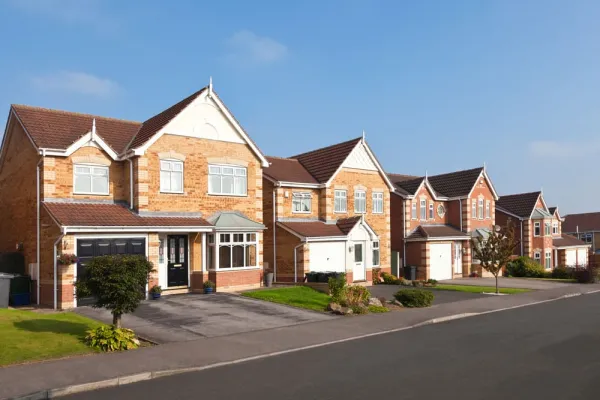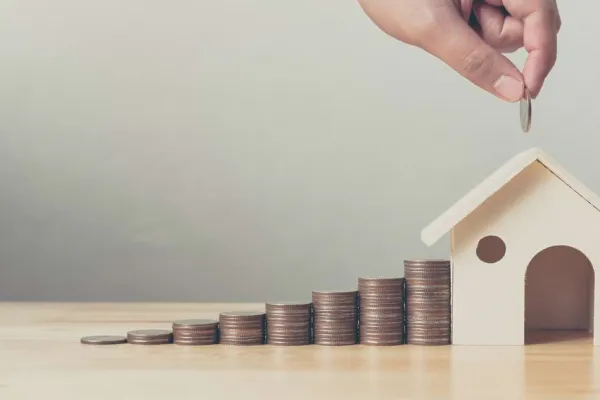When you buy or sell a house, you will likely be in a property chain.
It has an enormous impact on your overall buying/selling experience.
Read on to find out more about how they work.
What is a property chain?
A property chain is when buyers and sellers are connected and depend on each other for their house transactions.
This means all purchases and sales usually occur around the same day.
For example, someone selling a house might need another purchase to complete so they have somewhere to move into.
Or someone buying a house may only have the funds once they sell their existing property.
Bottom vs. top of the chain
Every property chain has someone at the top and the bottom of the chain. The bottom of the chain is usually a first-time buyer.
This means they are not selling another house to complete the purchase.
At the top of the chain is a seller not waiting to complete another purchase.
They already have their living situation sorted and do not depend on the funds from their sale to buy elsewhere.
Communication matters
Your solicitor and estate agent must communicate with the people close to you in the chain.
Everyone needs to coordinate so completion dates can be arranged at similar times.
The deal may be slowed down by factors elsewhere in the chain entirely out of your control.
How long is a property chain?
The length of a property chain varies for every deal.
The longer the chain, the more people you communicate with and the more things that can go wrong.
The shortest property chain is no chain at all. This is when a chain-free buyer purchases from a chain-free seller.
These two people are independent of anyone else to complete the transaction. It is only the two involved.
A property chain can have a dozen or more people in other instances.
Your solicitor and estate agent will only communicate with some people in this.
They’ll get the important information on everything that directly affects your sale.
Longer chains take to slow down all house transactions involved. They are also more complicated. More things can go wrong.
What causes a property chain to break down?
There are several common causes for a property chain breaking down.
Mortgage issues
A buyer might:
- Gets a mortgage rejected
- Lose their job
- Disagree with the bank over the house’s value.
This has a knock-on effect throughout the rest of the chain.
Difference of opinions
Any other issues with a sale are also common causes of a breakdown in the chain.
This might be because a buyer or seller has changed their mind. Two parties could also disagree over pricing and reach a standstill.
Slow selling process
Some of the other small events that can have significant consequences on the chain include:
- People going on holiday
- Slow processing of local searches
- Incorrect information given
- Loss of documentation
- Problem with transferring funds.
Survey issues
Discovering property defects can delay a sale by several weeks or months.
If this occurs anywhere in the chain, it has a knock-on effect. You should wait while a new survey is completed and the people involved negotiate the price.
Poor communication
Poor communication between estate agents and solicitors is another common explanation.
If a conveyancer is slow to complete their tasks, it can affect the entire chain.
How can I avoid a property chain?
It can be challenging to avoid a property chain altogether. But there are ways to do it.
If you are buying, you must find a seller with no onward chain. This means they don’t rely on your money to purchase another house.
Platforms such as Rightmove and Zoopla advertise when there is no onward chain.
This means that if you are a chain-free buyer, you can avoid chains completely
Cash buying companies are another useful to avoid housing chains. If you are selling a house, they will be a chain-free buyer.
This means the sale can be completed in whatever timeframe works best for you.
You then just need to find another place to live in the meantime. This could be with a family member, friend, or in rented accommodation.
Some cash buying companies also offer a house-selling facility. This means that you can possibly buy a property directly from them without a chain.
Sold.co.uk is an excellent example.
Another type of house that is usually chain-free is a new build. The construction company usually sells these and is thus not in an onward chain.
Keep an eye out for properties available that meet this criteria.
You have plenty more ways to avoid property chains. Speak to an expert for more guidance.
Advantages of a property chain
Property chains are the most realistic way of buying or selling a house for most people.
It is difficult to become chain-free if you cannot temporarily move in with a family member, or don’t already have lots of money. Housing chains make the deal possible.
When selling a house, you are far more likely to find a buyer if you accept the need to be part of a chain.
Chain-free buyers are far less common, especially in the higher price range. You have more buyers to choose from and thus can find a high-quality candidate quickly.
Disadvantages of a property chain
A property chain always has the possibility of breaking down. This can collapse your deal and leave you back to square one.
You can be left in a very difficult position if you have already committed to a purchase/sale elsewhere.
Your transaction often takes longer in a housing chain. Chain-free purchases can move quicker because you aren’t waiting for many other people to get their act together.
You can thus move onto your next chapter quicker when you are chain-free.
















